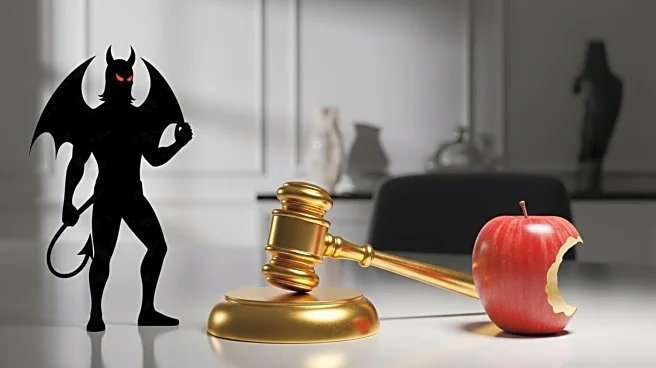What's Happening?
The latest episode of South Park's 27th season, titled 'Wok Is Dead,' aired on September 3, 2025, and continued the show's tradition of satirical commentary on current events. This episode featured President Trump in a humorous narrative involving tariffs, Satan, and a fictional toy craze called Labubus. The episode depicted Trump as having a peculiar relationship with Satan, leading to comedic situations that included Fox News reporters questioning Trump's interactions with the Prince of Darkness. The storyline also touched on economic themes, with tariffs affecting the price of the sought-after Labubus toys, drawing parallels to real-world economic policies.
Why It's Important?
South Park's satirical approach to political and economic issues provides a unique lens through which viewers can engage with current events. By incorporating President Trump and tariffs into its narrative, the show highlights ongoing discussions about trade policies and their impact on consumers. The episode's portrayal of media interactions with political figures also reflects broader societal conversations about media bias and political coverage. This kind of satire can influence public perception and spark dialogue about the complexities of political and economic decisions.
What's Next?
South Park's season 27 will continue with its bi-weekly release schedule, with the next episode expected on September 17, 2025. The show's ongoing exploration of political and social themes suggests that future episodes may delve into other current events, potentially influencing public discourse. As the season progresses, viewers can anticipate more satirical takes on prominent figures and policies, maintaining the show's reputation for provocative storytelling.
Beyond the Headlines
The episode's depiction of President Trump and Satan in a comedic context raises questions about the ethical boundaries of satire. While South Park is known for pushing limits, the portrayal of political figures in exaggerated scenarios can lead to discussions about the role of satire in shaping public opinion. Additionally, the episode's focus on tariffs and consumer goods reflects broader economic trends, prompting viewers to consider the real-world implications of trade policies on everyday life.








